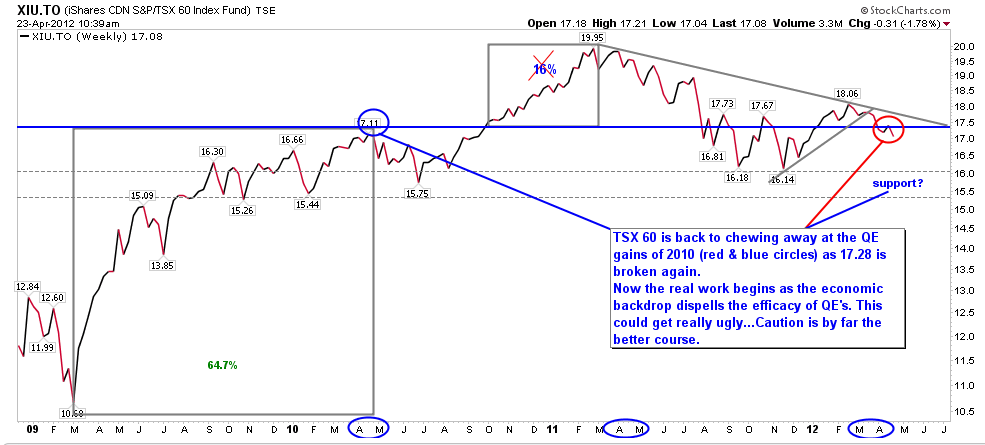The big picture Canadian TSX 60 largest companies, has now fallen below its May 2010 level as captured in the below chart. We know that QE efforts have not succeeded in reinvigorating growth in the real economy, but they have also failed to bring any lasting gains to asset markets. We are living in a distorted world of disconnects thanks to constant Central Banker intervention. One very obvious example is that oil prices were goosed on liquidity and levered trading the past 3 years even as global demand continues to weaken. At the same time, energy companies have proven a poor investment notwithstanding triple digit oil prices. In just the past 12 months the Canadian energy index has fallen about 20%, with many of the most popular picks down much more (Suncor and Canadian Natural Resources down more than 25%, Canadian Oil Sands more than 30%.) Not surprisingly, some of the biggest commodity advocates have also lost heavily again (Sprott Inc. is back below $5.00, more than 50% below its new issue price of $10 in May 2008).
 Source: Cory Venable, CMT, Venable Park Investment Counsel Inc.
Source: Cory Venable, CMT, Venable Park Investment Counsel Inc.



Danielle, you know hat the issue is not the commodity price, but whether the producer is actually growing revenues. If input costs are climbing faster than the commodity… And more and more that’s what you hear analysts complaining about.
Anyone who understands economics even just a bit knows that QE is not a fix, since economic growth depends on growth in real wealth, not growth in currency units.
If one accepts that the QE is actually about helping the economy (and I’m not convinced of that), then one could argue that monetary inflation has worked in the past. It doesn’t seem to be working now because we’ve reached our limit and have to deliver. This means growth will be constrained, which means inflating the money supply will only further devalue money, unless central bank inflation is being off-set by real economy deflation (feed the banks, starve the economy). In that case it just causes massive distortion and misallocations and huge imbalances.
Under that scenario, I would think a correcting stock market is a sign of healing not distress.